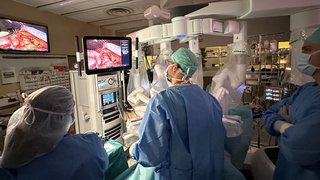
Chances are you’ve heard of a medical therapy called fecal microbiota transplant, or FMT, and wondered: Is that a real thing?
Nobody would blame you for being skeptical, but transplanting healthy “donor poop” into a patient suffering from gastrointestinal distress is a legitimate practice that dates back to ancient China. These days, FMT has become a social media sensation, with influencers and some medical companies touting it as a “miracle cure” for everything from irritable bowel syndrome to major depressive disorder. Demand is so high, in fact, there’s an underground market for donor stool.
Before you start Googling “how much does donor poop cost?” it’s important to know there is a lot of misinformation circulating about the uses for fecal transplants.
Since 1958, FMT has been recommended to prevent recurrent cases of Clostridioides difficile (C. diff), which occurs when bacteria grow out of control in the gut, causing severe diarrhea and gastrointestinal distress. The infection can return after treatment in 15%-35% of cases, and even mild cases can significantly reduce a patient’s quality of life. Symptoms of C. diff are so bad patients usually don’t bat an eye when we suggest fecal transplant to prevent future illness.

While FMT may sound a little gross – it is the transfer of donor stool in pill or enema form – it prevents C. diff recurrence over 90% of the time.
Here’s the thing to know. FMT is only approved by the U.S. Food and Drug Administration (FDA) to treat recurrent C. diff infections. It can be considered for use in patients after the second recurrence (third episode) of C. diff infection. And it’s only safe when the donor stool is gathered under stringent protocols and transplanted by a gastrointestinal specialist. Tainted stool samples sourced from medical spas or online vendors may not be tested for “bad” bacteria, viruses, or toxins, which can cause debilitating pain, severe dehydration, colon inflammation, and even sepsis – a potentially fatal blood infection.
In other words, please don’t try this at home.
Administered properly, fecal transplant can be a very effective therapy. So let’s discuss its approved treatments and what to expect if your gastroenterologist recommends FMT for a recurrent C. diff infection.
"In a C. diff infection, 'bad' bacteria overrun the 'good' bacteria in the gut that control the immune system and help digest food. A mild case can cause diarrhea three or more times a day as well as stomach cramping and pain. Severe infections can cause dehydration, difficulty digesting food and passing gas, and can be fatal if left untreated.."
Ngozi Enwerem, M.D.Assistant Professor in UT Southwestern's Division of Digestive and Liver Diseases
How do you know donor stool is safe?
Donor fecal material is extensively screened and processed. Donors are screened to make sure they have not had antibiotic exposure in the last six months and are free from immunocompromising or infectious conditions, such as:
- Intestinal parasite infections
- Hepatitis A, B, and C
- Syphilis
- C. diff
- HIV
FMT is safe when you get it through a medical center such as UT Southwestern that has experience treating recurrent C. diff. But keep these two points in mind:
- It is not safe to try FMT at home outside a doctor’s care, despite what you might’ve read elsewhere.
- It is not safe to buy donor stool online or gather samples from a loved one. Unscreened samples can cause worse illness or introduce new infection.
How is a fecal transplant administered?

If you’re getting an FMT, you might get the transplant in one of several ways:
- Colonoscopy: A doctor can place an FMT through a colonoscopy, with the medication being delivered similar to an enema. After the procedure, the patient will lie flat for a few minutes to ensure the material is properly distributed in the bowels.
- Enema: In 2022, the FDA approved live-jslm, a pre-formulated fecal microbiota suspension that is administered as an enema. This can be done without the need for a GI procedure such as a colonoscopy. A bowel prep is not needed prior to its administration.
- Pill form: In 2023, the FDA approved live-brpk (Vowst), an oral FMT containing fecal microbiota spores. The pills are used only after completing the recommended antibiotic course for C. diff. (two to four days afterward) and are not recommended to be used for treatment of the disease. Before using the pills, bowel preparation with a laxative such as magnesium citrate is used to clear out any leftover antibiotics from your gut. This allows the medication to work properly.
After treatment, patients should be able to eat, drink, and move normally. Minor side effects, such as gas, bloating, or fecal leakage may occur. More research is needed to determine whether the benefits of FMT are permanent, returning the gut microbiota to a healthier state.

How common is C. diff?
C. diff is a naturally occurring bacterium in the air, soil, and water. About 3%-5% of people have C. diff in their body with no ill effects. But in about half a million cases in the U.S. each year, C. diff causes an infection that is typically spread through the fecal-oral route – ingesting something tainted by feces. It can also spread by touching contaminated surfaces and then touching the mouth. C. diff also exists in the environment as inactive spores that can become active again once inside the body. With their protective coating, these spores can survive for months on various surfaces and are notoriously hard to kill.
Most of the time, the immune system can fight off small amounts of C. diff. But patients with weakened immune systems or advanced age are at increased risk of infection, along with people who have taken antibiotics for too long or when unnecessary, which can eliminate too much helpful gut bacteria.
There’s good news: Rates of C. diff have been decreasing in the last several years, with the Centers for Disease Control and Prevention (CDC) reporting an overall downward trend from 2012-2022. This may be in part due to the more careful prescription of antibiotics due to concerns about antibiotic resistance. In many cases, it is preventable and, if treated promptly and properly, can be cured.
How is a first-time C. diff infection treated?
The standard treatment for first-time C. diff is antibiotics. It may seem strange that antibiotics are used to treat an infection that can also be caused by excessive antibiotic use. The key is what exactly the antibiotics are targeting. Vancomycin or fidaxomicin, for example, are antibiotics that target C. diff specifically while also leaving most of the gut microbiota intact. This targeted approach allows for effective treatment of the infection while preserving the overall balance of beneficial bacteria in the gut.
Patients take these antibiotics orally for up to 10 days. The doctor may stop or pause previous antibiotic treatments.
How can you prevent C. diff infection?
The best way to prevent C. diff is to wash your hands regularly with soap and water. (Sounds familiar, right?) If someone in a household has C. diff, that person should use a separate bathroom if possible until treatment is complete. If at risk of C. diff exposure, people should keep their hands away from their mouth and do laundry separately and with gloves.
The CDC also recommends that people use a solution of one part bleach and nine parts water to clean common surfaces such as:
- Toilets
- Doorknobs
- Cup and mug handles
- Refrigerator handles
- Kitchen surfaces
- Shared electronics, such as remotes and game controllers
Do not try a fecal transplant at home
Fecal transplants done in a medical setting are completely safe for treating recurrences of C. diff. However, FMT is not approved for treating any other illnesses – using donor stools for other purposes can result in serious illness.
Donor stools used in hospital FMTs are screened thoroughly to prevent illness. You don’t have the same guarantee when you source a sample at home or from a nonmedical provider. Research is still pending on whether FMTs are useful for other diseases and disorders. There may be a future where FMTs are approved for a wider range of uses. But for now, they remain solely safe for treating recurrent episodes of C. diff infection.
To talk with a specialist about fecal microbiota transplant for recurrent C. diff, call 214-645-8300 or request an appointment online.










